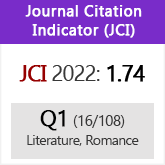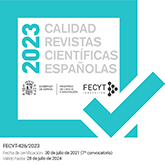Powerless but armed. Slavery and cognition in Miguel de Cervantes’ El amante liberal
DOI:
https://doi.org/10.3989/anacervantinos.2011.008Keywords:
Matrimony, exemplarity, orientalismAbstract
In his exemplary novel El amante liberal, Miguel de Cervantes uses the oriental setting to question the conventional representations of matrimony, gender, masculinity and feminity, individualism and freedom. Unlike other contemporary texts, his novel does not establish an opposition between the Muslim and the Christian world, but instead subtly points to the parallels between the two. In the following, our interpretation will lead to a new understanding of the novel’s title as well as of its exemplarity. It will be demonstrated that the official (Christian) discourse of love and matrimony takes on a new meaning when paralleled to its equivalent in the Muslim world.
Downloads
Download data is not yet available.
Downloads
Published
2011-12-30
How to Cite
Ruhe, C. (2011). Powerless but armed. Slavery and cognition in Miguel de Cervantes’ El amante liberal. Anales Cervantinos, 43, 205–220. https://doi.org/10.3989/anacervantinos.2011.008
Issue
Section
Studies
License
Copyright (c) 2011 Consejo Superior de Investigaciones Científicas (CSIC)

This work is licensed under a Creative Commons Attribution 4.0 International License.
© CSIC. Manuscripts published in both the printed and online versions of this Journal are the property of Consejo Superior de Investigaciones Científicas, and quoting this source is a requirement for any partial or full reproduction.All contents of this electronic edition, except where otherwise noted, are distributed under a “Creative Commons Attribution 4.0 International” (CC BY 4.0) License. You may read here the basic information and the legal text of the license. The indication of the CC BY 4.0 License must be expressly stated in this way when necessary.
Self-archiving in repositories, personal webpages or similar, of any version other than the published by the Editor, is not allowed.














